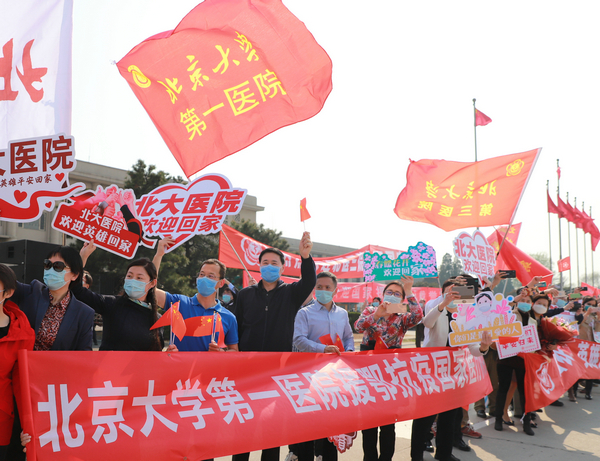 |
|
Peking University First Hospital's team returns to Beijing after completing its mission in Wuhan on April 6. [Photo/Xinhua] |
Maximizing resources
Li took part in the fight against the SARS outbreak in China 17 years ago. He says COVID-19 has some similarities and differences with SARS.
"The duration of the severe illness was long and there were many details that we needed to pay attention to. So we were vigilant all day," Li says.
Some COVID-19 patients' conditions suddenly got serious after seven or 10 days without any early symptoms, so the team enhanced monitoring of patients.
"For some patients who get hypoxemia, they may not feel it and can still do some physical activities or take phone calls, but their oxygen levels drop sharply, which is very dangerous and needs special monitoring," he says.
One morning on the way from his hotel to the hospital, Li almost cried when hearing the message that one of his patients' oxygen saturation had returned to over 90 percent-it was a good sign, though it only lasted for a moment.
In a Chinese journal, Li writes: "We tried our best and kept an eye on all health parameters to avoid drops in the oxygen levels because of any short-time mask removal from the patient. The patient's will power made us believe that she would make it through."
Among the 31 doctors in the team, seven were respiratory experts, three worked in critical care and the others specialized in cardiology, gastroenterology, endocrinology, hematology, nephrology, and rheumatology and infectious diseases. Li arranged the shifts for the doctors.
"It is not a simple treatment of pneumonia, as the virus infects many systems in the body. Sometimes the therapeutic schedule might be a double-edged sword. For example, the measures to control the pneumonia might damage the immune system, and there is also potential infection," Li explains.
"We needed to discuss with doctors from different hospitals to give patients an effective treatment."
Li gave two endocrinology experts in his team a special task. When they were on duty, they needed to check all patients whose blood glucose levels were abnormal and based treatments on whether or not to use insulin and what dose.
Li also gave two doctors whose hometown is Wuhan an extra task-they took turns talking to patients in the local dialect every day.
"Our nurses were so nice to the patients that they always smiled. That gave the patients comfort."
Li's colleagues in Beijing assisted the team remotely.
There was one patient who got rashes. Li's team took photos and asked dermatologists in Beijing for advice.
Besides the day shift, Li had two other daily routines-joining discussions about treatments for difficult and complicated diseases with colleagues from Peking University's two other hospitals at 4 pm and meeting with medical groups, care groups and logistical groups at 7 pm.
A consultation center was built in Tongji Hospital, where doctors gathered every day to discuss seriously ill patients' cases.